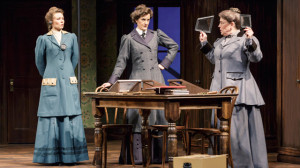It’s hard enough to try to get your groundbreaking scientific discoveries taken seriously when they go against the conventional wisdom laid down by the great minds of yore. But trying to do this when you’re also a woman in an overwhelmingly male-dominated field, and at a time when women still aren’t allowed to vote? Good luck with that.
Silent Sky is one of several plays that San Francisco’s Lauren Gunderson has written about scientists, and female scientists in particular. Like her earlier play Emilie: La Marquise Du Chatelet Defends Her Life Tonight, which South Coast Rep premiered in 2009 and Symmetry Theatre Company brought to the Bay Area in 2012, this one’s also about a brilliant real-life historical scientist struggling against sexism and accepted orthodoxy to gain recognition for her discoveries. But, again like Emilie, it’s also about the hunger for knowledge for knowledge’s sake, the tension between that obsessive work and personal relationships, and the frustration of there never being enough time in a life to truly finish what you started, having to leave others to carry on your work.

This one’s about Henrietta Leavitt, an astronomer at the turn of the 20th century. Employed at the Harvard College Observatory as a “computer,” doing the busywork of cataloguing and labeling the stars captured in photographic plates, Leavitt determined a way of measuring the rhythms of stars whose intensity of light fluctuated, making it possible for those who followed her to measure the distance to stars and galaxies and get the first real sense of the size of the universe. All this she did despite being forbidden, as a woman, to use the observatory’s telescope herself.
This is the latest in a steady stream of Bay Area productions by Gunderson, who premiered plays with Marin Theatre Company, Crowded Fire Theater and Shotgun Players last year and has another premiere coming up at San Francisco Playhouse in March. Unlike most of her other recent Bay Area productions, Silent Sky is not a world premiere but a second production (it debuted at South Coast Rep in 2011), and that’s a good thing. It’s one of Gunderson’s more complete and polished works, and whatever work has been done on the script since its first production seems to have done it good.
Meredith McDonough’s smart staging accentuates the romanticism of the story with stirring piano music by Jenny Giering that swells up as if the characters are about to burst into song. Annie Smart’s terrific set depicts an elegant domed observatory, though a telescope is conspicuously and appropriately absent. Along with Fumiko Bielefeldt’s prim period costumes, the handsome, old-fashioned wooden furniture roots us in the period.

Elena Wright makes a luminous Henrietta, fit to burst with frustration and drive and unanswered questions that she can’t bear to leave unanswered, most notably where exactly we are in the universe. She’s feverish in her scientific zeal and pricelessly flustered at any hint of personal entanglement. (She’s also practically deaf and reliant on a large hearing aid.) Jennifer Le Blanc exudes kindness and sympathy as Henrietta’s sister Margaret, who doesn’t pretend to understand all this highfalutin talk but just wants to be there for her family, and is hurt when she feels her sister isn’t there for her.



